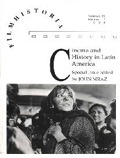The Revolution is History: Filming the Past in Mexico and Cuba
Abstract
As is their nature, social revolutions in Mexico and Cuba dramatically altered the lives of millions.1 During the «effervescent» periods which followed the uprisings's triumphs, political and socioeconomic transformation bettered the lot of most people, and cultural creativity flourished; unfortunately, the revolutions were later deformed into dictatorships -of party in Mexico, of individual in Cuba.2 Caught up in the midst of these soul-shaking metamorphoses, filmmakers have reflected critically on the legitimizing myths of the New Orders, as well as participated enthusiastically in their construction. The revolution itself is the founding legend, the keystone chronicle of these cultures; it is history in the simplest sense of the word, for the films are reconstructions of times past. I want to examine how some of the best directors of the better films in Mexico and Cuba have portrayed the revolutions in their countries, as well as interrogate their use of history in constructing concepts of nation and identity.Downloads
Issue
Section
Essays







